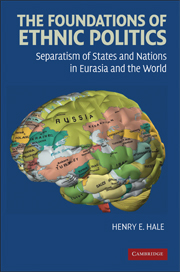Book contents
- Frontmatter
- Contents
- Acknowledgments
- Note on Transliteration
- 1 INTRODUCTION
- Part I Theory with Worldwide Examples
- Part II Case Comparisons: Separatism in Eurasia
- 5 ETHNICITY: IDENTITY AND SEPARATISM IN THE USSR 1917–1991
- 6 CENTRAL STATE POLICIES AND SEPARATISM
- 7 FRAMING: MANIPULATING MASS OPINION IN UKRAINE AND UZBEKISTAN
- 8 INSTITUTIONALLY MEDIATED INTERESTS: THE POLITICAL ECONOMY OF SECESSIONISM
- 9 ETHNICITY AND INTERNATIONAL INTEGRATION: THE CIS 1991–2007
- 10 QUANTITATIVE EVIDENCE: MICRO-, MACRO-, AND MULTILEVEL
- Part III Conclusion
- Index
- Other Books in the Series
- References
8 - INSTITUTIONALLY MEDIATED INTERESTS: THE POLITICAL ECONOMY OF SECESSIONISM
Published online by Cambridge University Press: 05 September 2012
- Frontmatter
- Contents
- Acknowledgments
- Note on Transliteration
- 1 INTRODUCTION
- Part I Theory with Worldwide Examples
- Part II Case Comparisons: Separatism in Eurasia
- 5 ETHNICITY: IDENTITY AND SEPARATISM IN THE USSR 1917–1991
- 6 CENTRAL STATE POLICIES AND SEPARATISM
- 7 FRAMING: MANIPULATING MASS OPINION IN UKRAINE AND UZBEKISTAN
- 8 INSTITUTIONALLY MEDIATED INTERESTS: THE POLITICAL ECONOMY OF SECESSIONISM
- 9 ETHNICITY AND INTERNATIONAL INTEGRATION: THE CIS 1991–2007
- 10 QUANTITATIVE EVIDENCE: MICRO-, MACRO-, AND MULTILEVEL
- Part III Conclusion
- Index
- Other Books in the Series
- References
Summary
The relational approach has explained separatism as a strategic response to an ethnically charged collective action problem in a union and has shown, through the cases of Ukraine and Uzbekistan, that individual leaders can use framing techniques to influence strongly whether their masses choose a separatist strategy. Both Ukrainian and Uzbek leaders could have framed options so as to have generated majority referendum votes for either “independence” or “union” in the crucial fall of 1991, but Ukraine's leaders chose a pro-independence frame, whereas Uzbekistan's opted for a unionist frame. These framing differences were most important at those key moments where a particular aggregation of the popular will was identical to republic policy, the independence referenda, but Ukraine tended to display more separatism than Uzbekistan at other moments, too. Two key questions thus remain. First, why did Karimov and Kravchuk adopt different framing strategies? Second, what drove the greater separatism of Ukrainian policies relative to Uzbek ones more generally, when no referenda were determining republic responses to every move Gorbachev made?
The theory of separatism presented in Chapter 4 suggests turning to the particular interests of the particular leaders and masses involved as well as to the institutions that link them. The relational theory of ethnicity holds that senses of ethnic identity are driven by a need for uncertainty reduction, whereas ethnic politics are motivated by the pursuit of interests, as described in Chapter 3 and 4.
- Type
- Chapter
- Information
- The Foundations of Ethnic PoliticsSeparatism of States and Nations in Eurasia and the World, pp. 161 - 189Publisher: Cambridge University PressPrint publication year: 2008



